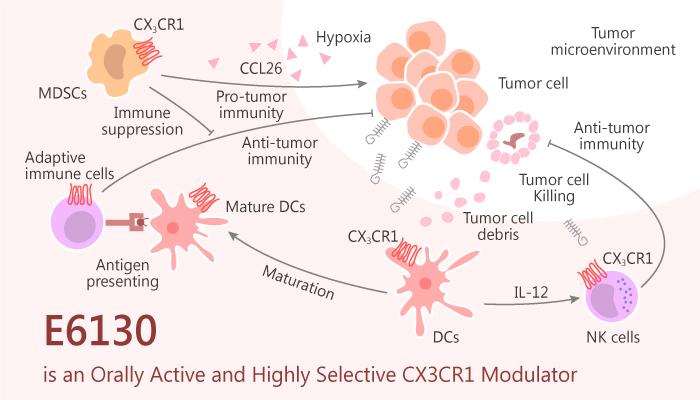Infiltration of leukocytes from the peripheral circulation into tissues such as the gut mucosa is an important aspect of immune surveillance. They interact with cytokine or other proinflammatory stimuli-activated endothelial cells. However, they do this via either leukocyte cell-surface chemokine receptors or integrins and immunoglobulin superfamily cellular adhesion molecules. Chemokines and their receptors are also important means of orchestrating tissue-specific and cell type–selective leukocyte trafficking. Fractalkine/CX3CL1 is a chemokine. It functions as both an adhesion molecule and a chemotactic factor. Meanwhile, fractalkine binds to its sole receptor, CX3C chemokine receptor 1 (CX3CR1). The surfaces of monocytes, macrophages, dendritic cells, microglia, natural killer (NK) cells, and cytotoxic effector T-cells express CX3CR1. It contributes to the development of chronic inflammation. In addition, the pathogenesis of several diseases, including inflammatory bowel diseases correlates with CX3CL1 and its receptor CX3CR1. E6130 is an orally available and highly selective CX3CR1 modulator.

E6130 is an orally available and highly selective CX3CR1 modulator.
In this study, E6130 inhibits the chemotaxis of NK cells, with an IC50 value of 4.9 nM. It also induces the down-regulation of CX3CR1 on the cell surface of CD56+ NK cells with an EC50 value of 5.2 nM. E6130 has agonistic activity with respect to [35S]GTPγS binding (EC50=133 nM) and β-arrestin recruitment (EC50=2.4 μM) through CX3CR1. No antagonistic activity of E6130 is observed in the presence of fractalkine.
E6130 significantly improves stool consistency from day 18 at doses of 10 and 30 mg/kg. In addition, it significantly ameliorates body weight loss. Furthermore, E6130 significantly ameliorates the increased colon weight-to-length ratio as well as the increase in the number of CX3CR1+ lymphocytes in the lamina propria. E6130 prevents colon-length shortening and suppresses body weight loss in a Murine Oxazolone-Induced Colitis Model.
In summary, E6130, as a CX3CR1 modulator, is a potentially useful therapeutic agent for treatment of inflammatory bowel diseases.
Reference:
Wakita H, et al. Mol Pharmacol. 2017 Nov;92(5):502-509.